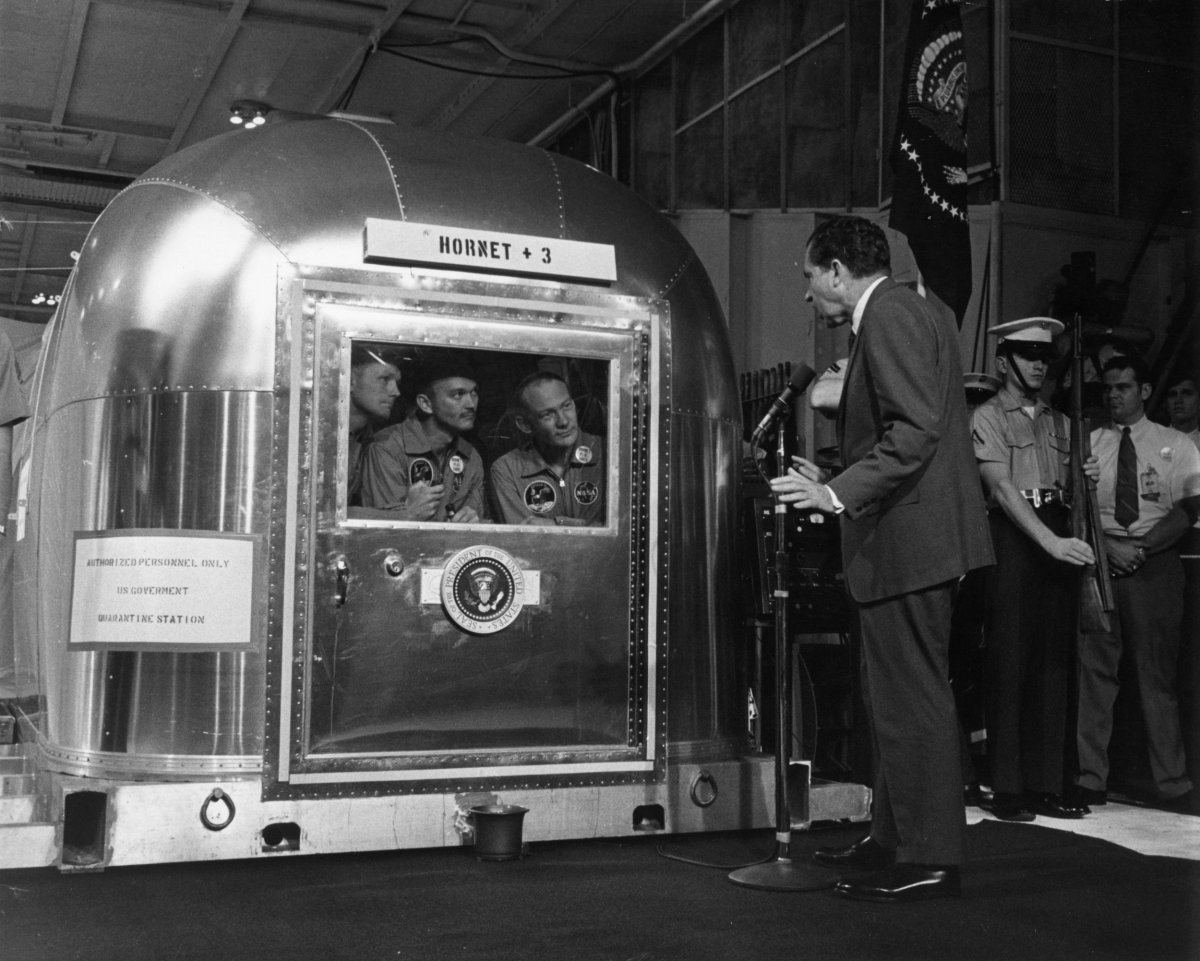
On this day in 1969, Neil Armstrong, Michael Collins and Edwin "Buzz" Aldrin splash-landed in the North Pacific Ocean after a space expedition that changed the world.
The men had been on board Apollo 11, the first mission to successfully land two human beings on the moon.
The mission marked Washington's victory over the Soviet Union in the so-called space race and was widely feted as an unmitigated success. It also produced one of the most memorable (and disputed) quotes of the 20th century, when Armstrong said upon setting foot on the moon, "That's one small step for a man, one giant leap for mankind."
But the mission was also a massive risk, coming just eight years after NASA's first successful mission to put an American in space. The astronauts would spend more than two hours outside the spacecraft collecting samples on the lunar surface. They then had to blast off to enter the moon's orbit in the Columbia spacecraft that would take them home.
President Richard Nixon was ready for the possibility that the mission would not end in success. Were the men to be stranded on the moon and unable to take off—a situation that seemed possible until Aldrin used a felt-tip pen to fix a broken circuit breaker—protocol demanded that Mission Control would have to cut communications with the astronauts, leaving them to die or kill themselves on the moon.
To prepare for the worst, Nixon speechwriter William Safire wrote an alternative address for the president to read should the men not return. The speech, sent to Nixon's chief of staff, H.R. Haldeman, two days into the mission on July 18, is available on the U.S. National Archives website.

Titled "In Event of Moon Disaster," the speech began, "Fate has ordained that the men who went to the moon to explore in peace will stay on the moon to rest in peace." It went on to speak of Armstrong's and Aldrin's hypothetical deaths as "laying down their lives in mankind's most noble goal: the search for truth and understanding."
The speech indicated that the men's failure to return would not end NASA's mission to send humans to the moon. "Others will follow, and surely find their way home. Man's search will not be denied," it said. But it also stated that the two astronauts "were the first, and they will remain the foremost in our hearts."
The transcript included a note that said Nixon should telephone both of the men's wives before making the speech. After the statement was made, a clergyman was to follow the procedure for a burial at sea, commending the astronauts' souls to "the deepest of the deep" and finishing with the Lord's Prayer.
Thankfully, the speech never had to be broadcast. The full text is as follows:
"Fate has ordained that the men who went to the moon to explore in peace will stay on the moon to rest in peace.
These brave men, Neil Armstrong and Edwin Aldrin, know that there is no hope for their recovery. But they also know that there is hope for mankind in their sacrifice.
These two men are laying down their lives in mankind's most noble goal: the search for truth and understanding.
They will be mourned by their families and friends; they will be mourned by their nation; they will be mourned by the people of the world; they will be mourned by a Mother Earth that dared send two of her sons into the unknown.
In their exploration, they stirred the people of the world to feel as one; in their sacrifice, they bind more tightly the brotherhood of man.
In ancient days, men looked at stars and saw their heroes in the constellations. In modern times, we do much the same, but our heroes are epic men of flesh and blood.
Others will follow, and surely find their way home. Man's search will not be denied. But these men were the first, and they will remain the foremost in our hearts.
For every human being who looks up at the moon in the nights to come will know that there is some corner of another world that is forever mankind."
Uncommon Knowledge
Newsweek is committed to challenging conventional wisdom and finding connections in the search for common ground.
Newsweek is committed to challenging conventional wisdom and finding connections in the search for common ground.
About the writer
Conor is a staff writer for Newsweek covering Africa, with a focus on Nigeria, security and conflict.
To read how Newsweek uses AI as a newsroom tool, Click here.








